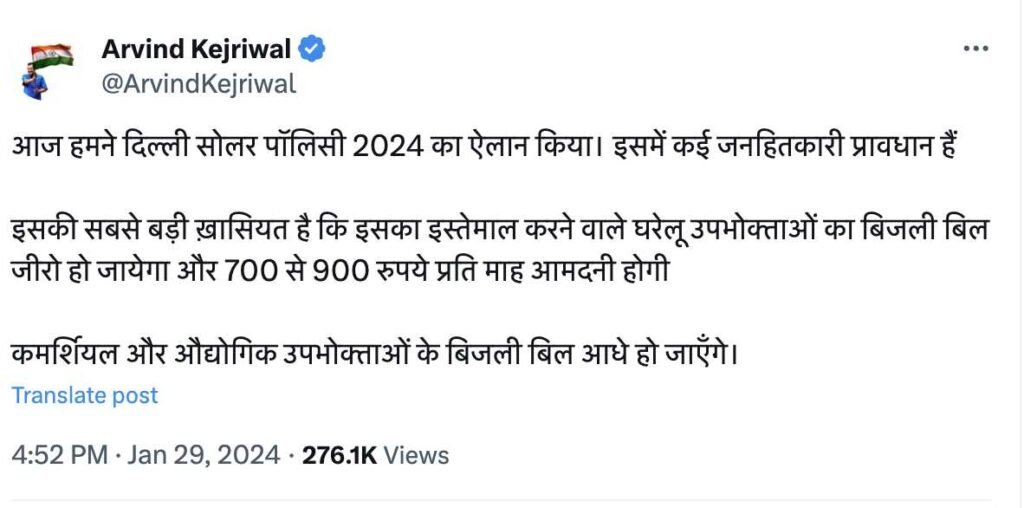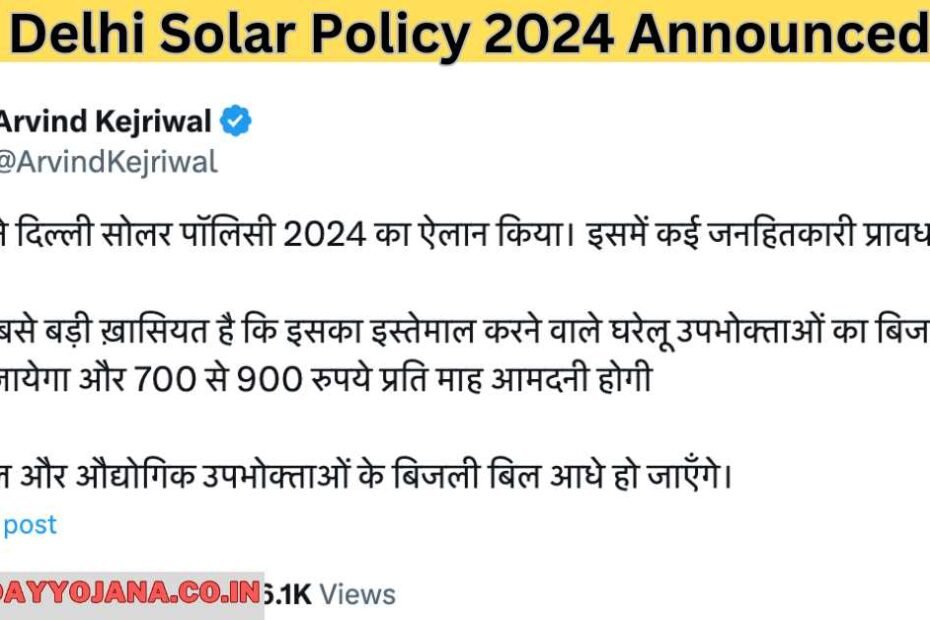The Chief Minister of Delhi, Shri Arvind Kejriwal has announced the Delhi Solar Policy 2024. In interaction with media he told that till now The Solar Policy 2016 was in effect. He Further stated that new Delhi Solar Policy 2024 is prepared by making amendments to the existing policy.
The Delhi Solar Policy 2024 is seen as CM Kejriwal’s answer to recently launched PM Suryoday Yojana.

Delhi Solar Policy 2024 Announced
The Motive of Delhi Solar Policy 2024 is to increase the total solar capacity of Delhi to 4500 Mw by March 2027. Current Capacity is 1500 Mw, so the Delhi government has set a target to increase the capacity to 3 times in next 3 years.
As people are aware, currently this is the structure of electricity bill payment in Delhi :
| Unit Consumed | Electricity Bill |
| 0 to 200 | 0 |
| 201-400 | 50% of the Bill Amount |
| 400+ | Full Bill needs to be paid |
As per the 2024’s Solar Policy of Delhi , Those who install Solar Panels on their rooftops will get 0 (Zero) Electricity bill irrespective of Monthly unit consumption. This means even if you use 500 unit of electricity but have installed solar rooftop system, your electricity bill will be zero.
Key Points:
- The Delhi government will offer Capital Subsidy to Solar RTS consumers. This will be Rs. 2000 per Kw on installation to upto max of Rs. 10000 per consumer.
- This subsidy will be additional subsidy to that offered under Solar Rooftop Program which offers Rs. 14588/Kw for 3KW capacity and Rs. 7294/Kw for a capacity of 3-10 Kw.
- All Existing building in Delhi with a rooftop area bigger than 500sqm will have to mandatorily install solar plants within the next 3 years.
New Solar Policy 2024 in Delhi – Benefits
Here are the benefits of newly announced Solar Policy in Delhi :
- Self dependency for electricity generation.
- Free Electricity to consumers : As mentioned above, those who install solar rooftops in Delhi get Zero Bill.
- Earning Potential : The additional generated electricity can be sold to the electricity department. This way, consumers can earn money too.
- Generation Based Incentive (GBI) to Commercial and Industrial Users @ Rs. 1 per unit.
Three Types of Models to be used
- Community Solar Model : This model allows consumers who don’t have suitable roof for the installation to access a system installed on other location.
- Peer to Peer Trading : This model allows the solar rooftop system owners to sell excess electricity to other consumers.
- Hybrid Resco Model : This model allows the smaller consumers who don’t have funds to install the system but have suitable space to benefit from this scheme.
GBI – Generation Based Incentive
What is GBI?
A fixed amount per unit of Generated solar power is given to the owner of Solar Rooftop plant. This is called GBI or Generation Based incentive.
Here is what you should know about GBI, Generation Based Incentive :
- For every unit of solar power generated, the Delhi Government will offer GBI or Rs. 3 for small rooftop plants (upto 3 KW) and Rs. 2 for Larger Plants (3 to 10 KW)
- The Amount under GBI will be adjusted against the monthly electricity bill.
- Any excess amount will be deposited to the consumer’s bank account every month.
Delhi Solar Policy 2024 PDF
If you want to understand the key points of Delhi Solar Policy, you can download the pdf file and read it on your phone.
Quick Links
| Delhi Solar Policy PDF | Download Now |
| Helpful Video | View Here |
| Tweet by CM | Read Here |
